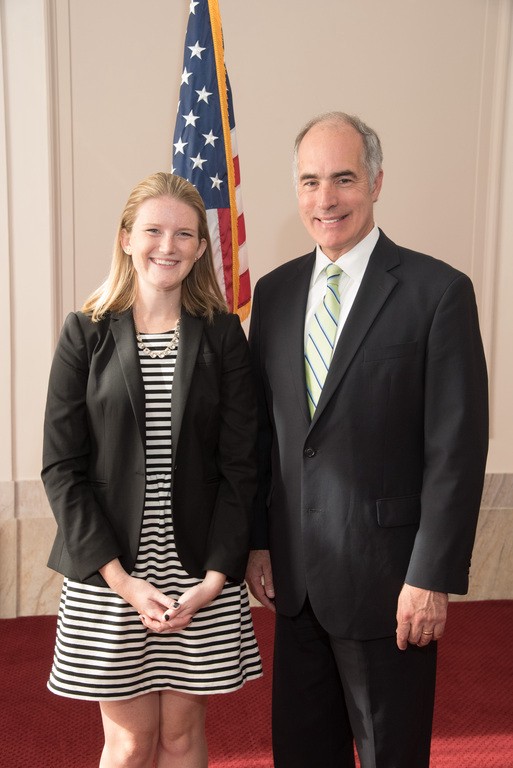
The University of Pennsylvania may only have a 9.4-percent acceptance rate, but despite these odds, Medford resident and Shawnee High School graduate Erin Hartman earned her admittance in 2014. Since then, her hard work, commitment to the health-care field and open-mindedness to new initiatives has led to her feature on the school’s website.
Growing up, Hartman always saw nursing as the career in which she could have the most impact on patients’ lives. Through participating in a volunteer program at Children’s Hospital of Philadelphia after her junior year of high school, Hartman had the opportunity to speak with an array of health-care professionals and learned that by being a nurse she could get exactly what she wanted out of a career — the ability to have an impact on patients’ daily lives and change the way they perceived and interacted with the health-care system.
“Ultimately, I chose Penn because of the array of opportunities in the health-care field. My mom highly recommended Penn saying that if I wanted to go into health care ‘it is the best place to be,’” Hartman said. “I knew I wanted to take an unconventional approach to making an impact within the sphere of health care and Penn had the resources to make that happen.”
Through her studies at the prestigious university, nursing transformed from her career goal into the platform by which she began her career in policy, giving her the hands-on experience she now relies on in her political endeavors. This shift in studies is what has landed her in the Wharton School, and as a member of the Student Committee on Undergraduate Education, Penn Democrats and a pre-professional health-care fraternity on campus. It is now additionally guiding her to eventually pursue a career in policy and law.
“I have always been interested in history, and from that interest grew my interest in politics and in policymaking,” Hartman said. “Public Policy, within health care, is the intersection between patient advocacy, history, economics, and politics — all subjects that I am passionate about. In the sphere of health care, each policy that is created can mean life or death for someone.”
Advancing her newfound studies in policy, this past year Hartman completed work on the health implications of paid family leave and has learned how the health-care, social and economic principles of policymaking intersect. Captivated by the idea of isolating an issue that shapes a patient’s experience, the advisor for her public policy program recommended that she apply for the Senate Committee on Health, Education, Labor, and Pensions on the Health Policy Team internship for the summer of 2016.
After applying for the internship online in January, she received confirmation that she had been selected in April. While working on the Democratic (Minority) Team, of which Sen. Patty Murray (D-WA) is the ranking member, Hartman has focused on women’s health issues, specifically cases of sexual violence, and has helped draft letters to cabinet secretaries and state officials urging them to take action on related issues.
Her daily responsibilities also include attending hearings and briefings all around Capital Hill that are health-related, keeping a pulse on health issues that surface in the news and preparing memorandums for the senior staffers.
“The letters I have written are my proudest piece of work. I have the ability to dive deep into an issue and present an argument for change,” Hartman said. “I really can’t imagine being in a better place for health-care policy.”
Aside from gaining valuable insight into the field of health-care policy, Hartman’s internship has also enabled her to network with a variety of senior staff members, including Tennessee Congresswomen Diane Black, as well as to solidify her policy-related career goals which include someday working to reform women’s health-care policy and to defend reproductive rights.
After graduation Hartman plans to work as a nurse for a few years in D.C. while completing a fellowship of some capacity on Capital Hill. She also hopes to someday work in an emergency room setting where patients can come in regardless of their socioeconomic status and whether or not they have health insurance. Additionally, in 10 years, she wishes to start a health-care policy think tank or not-for-profit that focuses on women empowerment and advocacy within health.
“I really believe strongly in the right of each and every person to affordable high-quality care regardless of their gender, race, socioeconomic status, or where they live. We are not there yet in America and I hope to work, whether it is on the Hill, as an attorney, or in public office of some capacity to reach that vision,” Hartman said. “I plan to fight for that so-deserved goal.”










